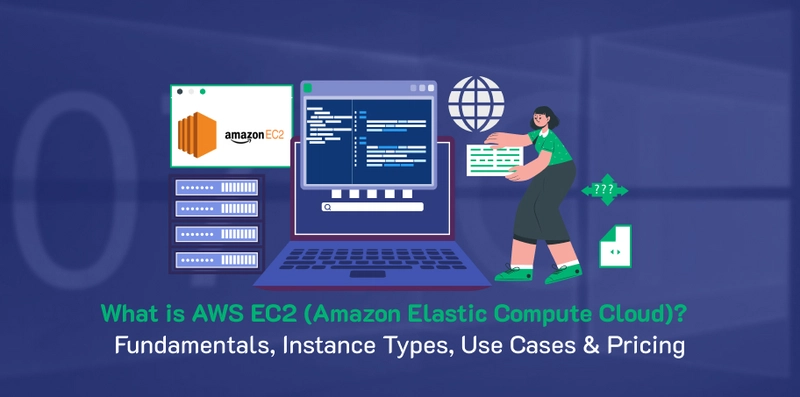What is EC2 in AWS? Everything about EC2 Fundamentals in AWS
What is Elastic Compute Cloud (EC2)? Elastic Compute Cloud or EC2 from Amazon Web Services (AWS), provides scalable virtual computing resources, generally known as instances, in an elastic environment in which computing powers can be conveniently scaled up and down according to demand. Generally, EC2 provides a vast number of options for instance type that can host general-purpose or compute-optimized and memory-intensive workloads. Features such as auto-scaling, load balancing, and integration with other AWS services allow for the efficient deployment of cloud applications. What is AWS EC2 (Elastic Compute Cloud)? Amazon Elastic Compute Cloud (EC2) is a hosted service offering flexible, resizable virtual computers, known as instances, to rent and run applications on as needed. This makes it easy to scale up or down rapidly, with on-demand infrastructure available that can be tailored to the requirements of a specific user group. The service consists of multiple instance types for different application needs, using various operating systems, and diversified storage options. EC2 integrates well with other AWS services and has features such as auto-scaling, load balancing, and multiple security options. This makes it suitable for a wide range of use cases, including web hosting, application development, and big data processing. What is Amazon EC2?What is Amazon EC2? Amazon EC2 is an AWS web service that offers a wide, resizable pool of computing resources in the cloud. It enables users to launch and manage virtual servers, called instances, based on customizable specifications that best meet the needs of different applications. EC2’s key feature is the ability to scale up or down computing power quickly against demand, thus allowing organizations to manage resources and keep costs under tight control effectively. Amazon EC2 is very flexible and supports all kinds of use cases. It supports every single web developer to the large business enterprises and deals with small scale testing and development to complex high demand applications. EC2 gives one powerful abilities such as auto-scaling, load balancing, and several instance types to fit each need. It can always scale efficiently with any project's growing demands. Why is AWS EC2 Important? 1. Scalability AWS EC2 is important due to its scalable features. Auto-scaling scales the number of instances according to demand, thus ruling out manual scaling. Elastic Load Balancing distributes traffic among instances, thus providing fault tolerance and availability. Thus, all these features make EC2 suitable for handling fluctuating workloads with high performance and reliability. 2. Flexibility EC2 is incredibly flexible with a vast array of instance types for almost every need. This includes CPU instances, instances for cached intense loads, huge memory instances, storage-intense instances, and instances powered by GPUs for machine learning and 3D rendering workloads. It is compatible with multiple operating systems, such as various Linux distributions, the Windows Server operating system, and customized AMIs. 3. Cost Efficiency Regarding advantages, it falls under the AWS EC2, where the cost aspect is considered one of the most important advantages. It incurs costs only for the time the user consumes in computations, so there is no need to purchase expensive hardware at once. Use Cases of Amazon EC2 1. Web Hosting Amazon EC2 is frequently used for hosting websites because of its elasticity. Using EC2, websites, and web applications can be launched and easily scaled as businesses leverage varying configurations depending on the expected traffic. For instance, an e-commerce site can use more instances during a festive season when many people make their purchases online to cope with the high traffic; hence, it can use a few instances during low-traffic periods to save costs. 2. Big Data and Analytics Big data processing and analytics are also attributed to EC2. It offers high-performance instance types to execute parallel processing to process Big Data using tools such as Hadoop and Spark. This way, businesses can harness the power of EC2 and use it as a platform for executing complex queries and data analyses at scale. Besides, EC2 is easily scalable compared to other AWS analytics services. For instance, Amazon EMR can support big data workloads. This capability is critical for industries like finance, healthcare, and retail, where the amount of data makes it imperative for deep analysis and insights. 3. Machine Learning Machine learning applications, for instance, draw high value from EC2 choice of instance types whereby there is an introduction of the GPU instances that are suitable for compute instances. IoT developers and data scientists can train, model, and deploy it by employing TensorFlow, PyTorch, and Apache MXN

What is Elastic Compute Cloud (EC2)?
Elastic Compute Cloud or EC2 from Amazon Web Services (AWS), provides scalable virtual computing resources, generally known as instances, in an elastic environment in which computing powers can be conveniently scaled up and down according to demand.
Generally, EC2 provides a vast number of options for instance type that can host general-purpose or compute-optimized and memory-intensive workloads.
Features such as auto-scaling, load balancing, and integration with other AWS services allow for the efficient deployment of cloud applications.
What is AWS EC2 (Elastic Compute Cloud)?
Amazon Elastic Compute Cloud (EC2) is a hosted service offering flexible, resizable virtual computers, known as instances, to rent and run applications on as needed.
This makes it easy to scale up or down rapidly, with on-demand infrastructure available that can be tailored to the requirements of a specific user group.
The service consists of multiple instance types for different application needs, using various operating systems, and diversified storage options.
EC2 integrates well with other AWS services and has features such as auto-scaling, load balancing, and multiple security options. This makes it suitable for a wide range of use cases, including web hosting, application development, and big data processing.
What is Amazon EC2?What is Amazon EC2?
Amazon EC2 is an AWS web service that offers a wide, resizable pool of computing resources in the cloud.
It enables users to launch and manage virtual servers, called instances, based on customizable specifications that best meet the needs of different applications.
EC2’s key feature is the ability to scale up or down computing power quickly against demand, thus allowing organizations to manage resources and keep costs under tight control effectively.
Amazon EC2 is very flexible and supports all kinds of use cases.
It supports every single web developer to the large business enterprises and deals with small scale testing and development to complex high demand applications.
EC2 gives one powerful abilities such as auto-scaling, load balancing, and several instance types to fit each need. It can always scale efficiently with any project's growing demands.
Why is AWS EC2 Important?
1. Scalability
AWS EC2 is important due to its scalable features. Auto-scaling scales the number of instances according to demand, thus ruling out manual scaling. Elastic Load Balancing distributes traffic among instances, thus providing fault tolerance and availability.
Thus, all these features make EC2 suitable for handling fluctuating workloads with high performance and reliability.
2. Flexibility
EC2 is incredibly flexible with a vast array of instance types for almost every need. This includes CPU instances, instances for cached intense loads, huge memory instances, storage-intense instances, and instances powered by GPUs for machine learning and 3D rendering workloads.
It is compatible with multiple operating systems, such as various Linux distributions, the Windows Server operating system, and customized AMIs.
3. Cost Efficiency
Regarding advantages, it falls under the AWS EC2, where the cost aspect is considered one of the most important advantages.
It incurs costs only for the time the user consumes in computations, so there is no need to purchase expensive hardware at once.
Use Cases of Amazon EC2
1. Web Hosting
Amazon EC2 is frequently used for hosting websites because of its elasticity.
Using EC2, websites, and web applications can be launched and easily scaled as businesses leverage varying configurations depending on the expected traffic.
For instance, an e-commerce site can use more instances during a festive season when many people make their purchases online to cope with the high traffic; hence, it can use a few instances during low-traffic periods to save costs.
2. Big Data and Analytics
Big data processing and analytics are also attributed to EC2. It offers high-performance instance types to execute parallel processing to process Big Data using tools such as Hadoop and Spark.
This way, businesses can harness the power of EC2 and use it as a platform for executing complex queries and data analyses at scale. Besides, EC2 is easily scalable compared to other AWS analytics services.
For instance, Amazon EMR can support big data workloads. This capability is critical for industries like finance, healthcare, and retail, where the amount of data makes it imperative for deep analysis and insights.
3. Machine Learning
Machine learning applications, for instance, draw high value from EC2 choice of instance types whereby there is an introduction of the GPU instances that are suitable for compute instances.
IoT developers and data scientists can train, model, and deploy it by employing TensorFlow, PyTorch, and Apache MXNet.
Amazon SageMaker perfectly integrates with EC2, offering a complete solution for developing, training, and hosting a model for both online and batch processing.
AWS EC2 Instance Types
General Purpose Instances
Multi-purpose instances can offer an optimal number of CPU, memory, and network I/O capable of many different kinds of work.
- T Series (T3, T3a, T4g): These are the best-performing instances that offer a minimum CPU capacity with an opportunity to scale up when needed. They are popular for web servers, development environments, and small-scale databases.
- M Series (M5, M5a, M6g, M6i): These examples provide options on the computing, memory, and networking amounts provided for use. They are appropriate for use in programs requiring small to medium-sized databases, data processing, and other backend server-type application s.
Compute Optimized Instances
They are specifically optimized for compute-bound applications and workloads demanding powerful processors.
- C Series (C5, C5a, C6g, C6i): These instances offer very high CPU capabilities and are suitable for compute-intensive workloads like hosting large web applications, scientific computations, batch operations, and dedicated gaming servers.
Memory Optimized Instances
Memory-optimized instances are built with high performance for capacity-intensive computations, especially on large data sets in memory.
- R Series (R5, R5a, R6g, R6i): Provides a high memory ratio over CPU, ideal for in-memory databases, big data analysis, and high-end databases.
- X Series (X1, X1e, X2gd): These orientations provide extra memory capacities for applications such as SAP HANA, real-time big data processing, and other enterprise applications that demand large memory chunks.
High Memory Instances
These instances provide from 4 to 24 TB of memory and are suitable for large in-memory databases, including SAP HANA production implementations.
Storage Optimized Instances
Storage-optimized instances offer high throughput and low latency for reading and writing large unstructured data on local volumes.
- I Series (I3, I3en): They are highly balanced and designed for latency-sensitive workloads and random I/O intensive applications such as Transactional databases, NoSQL databases, and Elasticsearch.
- D Series (D2, D3, D3en): These instances offer quite high density and are perfect for data warehousing, Hadoop distributed computing, and log processing workloads.
Accelerated Computing Instances
Accelerated computing instances refer to co-processors or circuits designed to execute certain relevant operations that can be performed at a higher performance speed than under an ordinary software application executed under a common CPU.
- P Series (P3, P4): Some of these instances utilize NVIDIA GPUs and are aimed at machine learning, deep learning, computational fluid dynamics, computational finance, seismic analysis, and molecular modeling.
- G Series (G4, G5): These modes are designed for graphics-centric workloads like remote graphics terminals, video transcoding, gaming, and machine learning inferencing.
- F Series (F1): They include cases using FPGA (Field Programmable Gate Arrays) for those areas as it is suitable for applications with HW acceleration requirements and for Genomics, Financial analysis, and Video processing.
High-Performance Computing (HPC) Instances
They are built for high-performance computing applications that require potent processing.
- Hpc Series (hpc6a): These examples provide high performance for systems that require the HPC to be highly coupled, such as computational fluid dynamics, weather modeling, and finite element analysis.
Features of AWS EC2
The solutions available within Amazon EC2 (Elastic Compute Cloud) for computing services include the following advantages of deploying virtual servers in the cloud. Here are some key features of AWS EC2:
Virtual Servers (Instances)
EC2 allows users to build instances or virtual servers within the cloud. A broad range of instance types, operating systems, and configurations allow users to select the most appropriate approach for their needs.
Flexible Pricing Models
There are multiple types of services for managing the costs, such as paying for the On-Demand instances, using Reserved instances and Spot instances, depending on how the client utilizes the services provided by EC2.
Scalability
Users can also increase or decrease the amount of computing power they use in an instance through EC2. It is simple for users to spin more instances or increase the size of the current instances to accommodate more activity or demand.
Elastic Load Balancing
ELB provides load-balancing features with EC2 to route the incoming traffic to several EC2 instances for availability and reliability.
Auto Scaling
This application enables users to set auto-scaling policies, which can automatically increase or decrease the number of EC2 instances used depending on the current traffic load.
Auto scaling policies can, therefore, be based on conditions like CPU usage, network traffic, or any other condition that the user may specify.
Pricing of AWS EC2
There are four ways to pay for Amazon EC2 instances: On-Demand Instances, Savings Plans, Spot Instances, and Reserved Instances (RIs).
On-Demand Instances
You are charged for your compute capacity per hour, depending on the instance type. It eliminates the need for long-term commitments and does not involve any initial payment.
You can scale up or down compute capacity to match your application requirements and only pay the stipulated per-hour rate of the instance you select.
- It is intended for users who want the flexibility of Amazon EC2 services at low cost and without paying upfront fees or signing contracts.
- Legacy applications with short burstable or intermittent workloads that cannot afford to be disrupted.
- First-time usage or testing of an application on Amazon EC2 that is still being built or refined.
Savings Plans
This pricing strategy comes at a lower cost for Amazon EC2, SageMaker, Lambda, and Fargate, where the customer agrees to maintain a set usage rate ($/hour) for one or three years.
Savings Plans is one of the most versatile pricing options with potential discounts of up to 72 percent on your AWS computing consumption.
It allows for lower prices on the usage of EC2 instances, no matter the family or size, OS, tenancy, or AWS Region, and is also applicable to SageMaker, Fargate, and Lambda.
The usage of such workloads is predictable and consistent; therefore, Savings Plans can offer substantial discounts compared to On-Demand. It is recommended for:
- Massive, steady-state volumes that experience relatively little fluctuation.
- Users who require varied instance types and compute solutions in different regions.
- Customers with financial capabilities make a fixed monetary commitment to the computing services for one or three years.
Spot Instances
Amazon EC2 Spot Instances enable you to negotiate for extra Amazon EC2 computing capacity at a markedly cheaper cost of up to 90% of the On-Demand price.
- Applications that don’t have to start at a specific time or end at a particular time of day.
- Applications that are only possible at extremely low compute cost.
- Customers with applications that cannot afford to take a hit and do not need to retain any state. Amazon EC2 determines spot Instance costs and vary incrementally depending on overall trends in Spot Instance supply and demand.
RIs
Amazon EC2 Reserved Instances offer a sizable discount (up to 72%) compared to the On-Demand Instance price for the same instance type.
Moreover, when RIs are hosted to a particular Availability Zone, they offer a capacity reserve, providing extra assurance that you can get your instances up when you want.
Conclusion
Find reliable, secure, and convenient features that will help you protect your software application and work on trust with your audience. Do not let complex and lengthy measures of code signing present themselves as an obstacle to interaction.
What's Your Reaction?

























